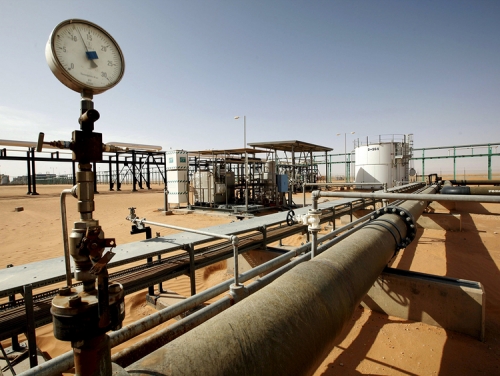Oil prices fall as supply concerns ease
Reuters
LONDON (Reuters) - Oil prices fell on Monday as force majeure at Libya's largest oilfield was lifted, a Norwegian strike affecting production ended and U.S. producers began restoring output after Hurricane Delta.
Brent crude was down 41 cents to $42.44 a barrel by 0650 GMT and U.S. West Texas Intermediate was at $40.18, down 42 cents.
"It's all about ending production disruptions ... (which) are not helpful in a period with ongoing demand concerns," UBS oil analyst Giovanni Staunovo said.
Production in Libya, a member of the Organization of the Petroleum Exporting Countries (OPEC), is expected to rise to 355,000 barrels per day (bpd) after force majeure at the Sharara oilfield was lifted on Sunday.
Rising Libyan output will pose a challenge to OPEC+ producers and their efforts to curb supply to support prices.
"If oil demand recovery continues to struggle due to new or stricter COVID-related mitigation measures, the (OPEC+) producer group may need to reconsider the planned tapering of their voluntary supply cuts," said BNP Paribas analyst Harry Tchilinguirian.
Front-month prices for both contracts gained more than 9% last week, the biggest weekly rise for Brent since June. But both fell on Friday after Norwegian oil firms struck a deal with labor union officials, ending a strike that threatened to cut the country's oil and gas output by close to 25%.
Hurricane Delta, which dealt the greatest blow to the U.S. Gulf of Mexico energy production in 15 years, was downgraded to a post-tropical cyclone at the weekend.
Workers headed back to production platforms on Sunday, and Total SA was working to restart its 225,500 barrel-per-day Port Arthur, Texas, refinery.
Prices were also pressured by a jump in new COVID-19 cases that have raised the specter of more lockdowns.
Infections are at record levels in the U.S. Midwest and in Britain Prime Minister Boris Johnson is expected to announce new measures on Monday, while Italy is preparing fresh nationwide restrictions.
Meanwhile, Goldman Sachs said the outcome of U.S. elections would not impact its bullish oil and natural gas outlook and that an overwhelming Democratic victory could be a positive catalyst for these sectors.
(Reporting by Bozorgmehr Sharafedin in London; additional reporting by Florence Tan in Singapore; editing by Jason Neely)
Related Posts

